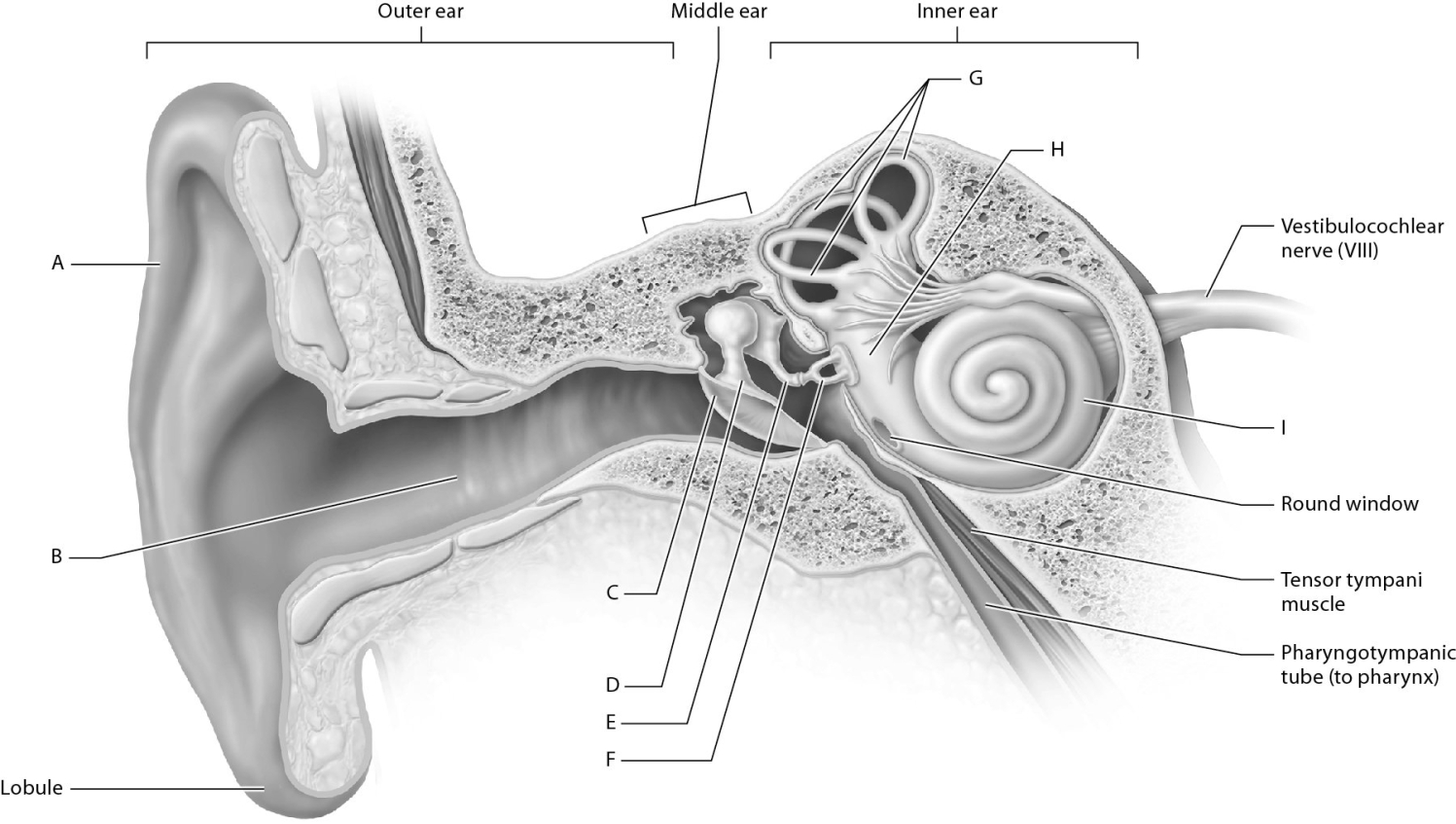A) rods are bleached and unable to function.
B) colors are dull.
C) we could see better in the dark.
D) we can only see color and not black and white.
F) All of the above
Correct Answer

verified
Correct Answer
verified
Multiple Choice
The olfactory nerves (CN I) are formed by:
A) olfactory bulbs.
B) axons of the olfactory neurons.
C) olfactory tracts.
D) supporting cells.
F) A) and D)
Correct Answer

verified
Correct Answer
verified
Essay
Describe the function of the lacrimal gland.
Correct Answer

verified
The lacrimal glands release tears and mu...View Answer
Show Answer
Correct Answer
verified
View Answer
Essay
Describe how light is refracted and focused on the retina in an emmetropic eye.
Correct Answer

verified
The greatest degree of refraction occurs...View Answer
Show Answer
Correct Answer
verified
View Answer
Multiple Choice
What unit of light stimulates photoreceptor cells in the retina?
A) glutamate
B) gamma ray
C) refractive index
D) photon
F) A) and C)
Correct Answer

verified
Correct Answer
verified
Multiple Choice
If the stapedius muscle is unable to reduce movement of the ossicles as a unit, how is hearing affected?
A) Hearing is not affected.
B) Sounds will be louder than normal.
C) We hear no sound.
D) Sounds will be softer than normal.
F) A) and D)
Correct Answer

verified
Correct Answer
verified
Short Answer
Match the following with the parts of the ear.

 -Vestibule
-Vestibule
Correct Answer

verified
Correct Answer
verified
Multiple Choice
Where are sound vibrations amplified?
A) tympanic membrane
B) vestibule
C) auditory ossicles
D) semicircular canals
F) A) and B)
Correct Answer

verified
Correct Answer
verified
Essay
Discuss how image -processing occurs in the retina when light strikes photoreceptors.
Correct Answer

verified
Rods and cones move from a depolarized s...View Answer
Show Answer
Correct Answer
verified
View Answer
True/False
An astigmatism is an irregular curvature of the cornea or lens which causes rays of light to refract unevenly.
B) False
Correct Answer

verified
Correct Answer
verified
Short Answer
Match the following with the parts of the ear.

 -External auditory canal
-External auditory canal
Correct Answer

verified
Correct Answer
verified
Multiple Choice
Damage to the hair cells of the spiral organ (organ of Corti) can result in a loss of:
A) hearing.
B) olfaction.
C) equilibrium.
D) vision.
F) C) and D)
Correct Answer

verified
Correct Answer
verified
Multiple Choice
Aiden was surprised to learn that his salad dressing contained glucose since it did NOT taste:
A) salty.
B) bitter.
C) sour.
D) sweet.
F) B) and C)
Correct Answer

verified
Correct Answer
verified
Multiple Choice
What secretes the aqueous humor?
A) iris
B) vitreous humor
C) lens
D) ciliary body
F) None of the above
Correct Answer

verified
Correct Answer
verified
Multiple Choice
The ability of the lens to change its shape from flattened to round is known as:
A) refraction.
B) convergence.
C) accommodation.
D) inversion.
F) A) and D)
Correct Answer

verified
Correct Answer
verified
Multiple Choice
Which auditory ossicle is connected to the tympanic membrane?
A) anvil
B) stapes
C) incus
D) malleus
F) A) and B)
Correct Answer

verified
Correct Answer
verified
True/False
Like all other sensory pathways, the nerve impulses associated with olfaction are routed through the thalamus on the way to the primary olfactory cortex.
B) False
Correct Answer

verified
Correct Answer
verified
Multiple Choice
Taste is detected when chemicals bind receptors on the microvilli of:
A) gustatory cells.
B) olfactory cells.
C) basal cells.
D) supporting cells.
F) A) and C)
Correct Answer

verified
Correct Answer
verified
Multiple Choice
What nerves carry information about the special senses to the CNS?
A) spinal nerves only
B) both cranial and spinal nerves
C) cranial nerves only
D) cervical nerves only
F) All of the above
Correct Answer

verified
Correct Answer
verified
Multiple Choice
Identify the cranial nerves NOT involved in carrying taste information from the tongue into the CNS.
A) vagus nerves (CN X)
B) facial nerves (CN VII)
C) glossopharyngeal nerves (CN IX)
D) hypoglossal nerves (CN XII)
F) B) and C)
Correct Answer

verified
Correct Answer
verified
Showing 81 - 100 of 127
Related Exams